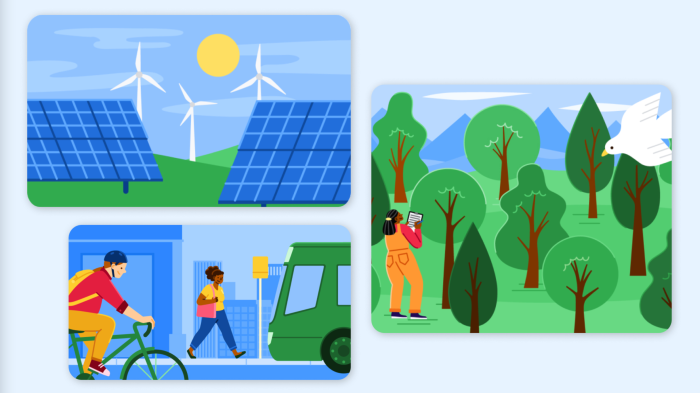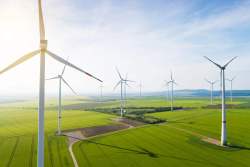- Meta is increasingly focused on maximizing emissions reductions across the electricity system, which means we need new tools and accounting frameworks to better understand the emissions impacts of our facilities and the projects we support.
- As part of our commitment to accelerating the renewable energy transition and reaching our own sustainability goals, we’re joining forces with Akamai, Amazon, General Motors, Hannon Armstrong, Heineken, Intel, Rivian, Salesforce, and Workday to create the Emission First approach, a set of new objectives and principles to update electricity greenhouse gas (GHG) emissions accounting systems.
- Updates to these standards have the opportunity to incentivize electricity GHG emissions reductions for companies of all sizes.
Greenhouse gas accounting standards play a crucial role in corporate climate strategies, providing the measurement frameworks companies need to ensure that the climate solutions they pursue are credible and will “count” towards corporate climate goals.
Today, companies use these accounting systems to measure their GHG emissions from purchased electricity (also known as Scope 2 emissions). To reduce these emissions, accounting standards and programs encourage companies to procure renewable energy at an annual volume equal to the amount of electricity purchased for their facilities. This approach has driven hundreds of new renewable energy projects onto grids around the world. Over the last 10 years corporate procurement has galvanized more than 110 gigawatts (GW) of new renewable energy.1
Meta also follows this approach, and we’re proud to support our global operations with 100% renewable energy since 2020. This achievement was central to our achieving net zero emissions for Scopes 1 and 2 (direct emissions and purchased electricity emissions) that same year. In the last decade, Meta has contracted more than 8 GW of new renewable energy projects, and we’ve focused on enabling new projects in the same regional electric grids on which our data center facilities operate.
Amping Up Impact Through an ‘Emissions First’ Approach
The electric industry has seen significant decarbonization progress in the last decade. Many of our electric utility partners have invested in carbon-free electricity supply and set their own goals. We’ve seen renewable energy technologies achieve broad commercial success and increasing opportunities to deploy energy storage, carbon-aware demand response and other clean energy technologies. We’ve also seen the impact that clean energy policies have on deploying carbon free generation across grids and countries.
The success of these clean electricity developments means that the location and timing of new carbon-free energy generation are more important than ever. Meta is increasingly focused on maximizing emissions reductions across the electricity system, which means we need new tools and accounting frameworks to better understand the emissions impacts of our facilities and the projects we support.
We are ready to embrace an accounting framework that moves beyond the current approach of megawatt-hour matching and focuses on the heart of the matter, emissions impact. In other words, we’re putting Emissions First.
Stakeholders are actively discussing ways to update GHG accounting standards. To help inform updates to these systems, Meta has joined Akamai, Amazon, General Motors, Hannon Armstrong, Heineken, Intel, Rivian, Salesforce, and Workday on the Emissions First partnership, a set of new objectives and principles to update electricity GHG emissions accounting systems and help ensure we have clear ways to measure emissions reductions to unlock decarbonization investments at scale.
As industry standards like the GHG Protocol Scope 2 Guidance consider revisions to the key accounting systems that underpin corporate clean energy procurement strategies, we offer these Emissions First accounting principles to focus stakeholders on updates that can improve accuracy, drive accelerated grid decarbonization, and ensure all companies can access to tools to decarbonize their electricity supply.
To learn more about Emissions First, visit emissionsfirst.com.
1 Corporate clean energy buying Tops 30GW mark in record year. BloombergNEF. (January 30, 2022). https://about.bnef.com/blog/corporate-clean-energy-buying-tops-30gw-mark-in-record-year/
News
Get the latest news about our sustainability work, download reports and case studies and explore our energy dashboards.

Sharing Our Progress on Combating Climate Change
As leaders and experts convene in Egypt for COP27, we’re outlining progress on our climate commitments and announcing expanded tools to help our communities take action against climate change.
November 6, 2022
Building Tools That Help Communities Take Action Against Climate Change
Addressing climate change requires a whole-of-society approach, and the communities people belong to have an important role to play. Hundreds of thousands of Facebook Groups already use our products to discuss and take action on climate change, and we’re excited to work with partners to test new tools to empower any community on Facebook to
November 4, 2022
Our Approach to Climate Content
At Meta, we understand that critical challenges like climate change lead to complex discussion across our apps. Much of that discussion is the type of expression and debate that is essential to building consensus and finding solutions to climate change. That’s why we take a comprehensive approach to climate-related content that educates and informs people
November 4, 20222023 Sustainability Report
We envision a just and equitable transition to a zero-carbon economy and are working to scale inclusive solutions that help create a healthier planet for all.





